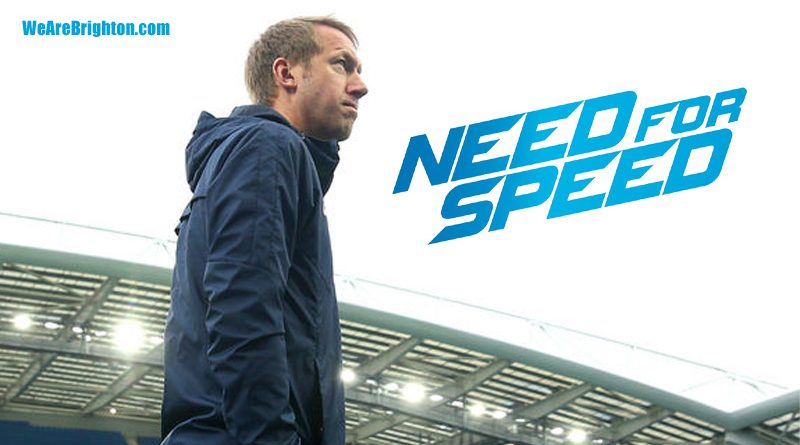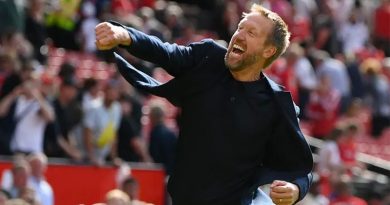Need for speed: Why Potter must add pace this summer
With Brighton & Hove Albion having mathematically confirmed their place in the Premier League for the 2020-21 season, attention will now turn to the summer transfer window. Everyone will have their own ideas about where Brighton need to strengthen, but there is one glaring area that needs addressing throughout the squad – a severe lack of pace.
It has been pretty evident for most of the season that this Albion squad is slow. If you managed to avoid falling sleep within 20 minutes of the 0-0 draw against Newcastle United, then it was even more apparent than normal.
The game was played at a pace that made Captain Sir Moore look like Usain Bolt. While casual observers could have been forgiven for thinking that was because it was a dead-rubber, end-of-season fixture between two teams already on the beach, regular Brighton watchers will know that the Albion lack the capability to play much quicker – even if they wanted to.
Which is a problem. For all the possession football that Brighton play, it doesn’t get you very far if you do not have pace to either run at full backs or break through defences.
Potterball, its pretty passes and its neat triangles is in part designed to create space to exploit. Quick players are the ones who benefit most from that space.
When your attacking players filling those spaces and trying to break lines are Aaron Mooy and Pascal Gross – who possess the speed of an Eddie Stobart lorry trundling up Mount Everest with the handbrake on – then you may find yourself struggling to get through.
Gross has become the poster boy when it comes to Brighton & Hove Albion’s lack of pace, which is unfair really as it isn’t just him. Mooy, Dale Stephens, Davy Propper – they all have their strengths which make them important members of the squad, but none of them are blessed with speed.
When you play all of them together without supplementing their abilities with players who possess pace, you have a side who at times look like they are trying to wade through treacle whenever they go forward.
Against Newcastle, the only players in Potter’s starting lineup who offered a modicum of quickness were Tariq Lamptey, Leandro Trossard, Neal Maupay and perhaps Yves Bissouma.
Potter does have other players with pace within his Brighton squad – the problem is, he doesn’t seem to rate any of them. Solly March can take a man on but has fallen from favour in 2020.
Bernardo has found himself as second choice left back behind Dan Burn. Alireza Jahanbakhsh might be quick, but he has featured so little in 2019-20 that it is hard to remember.
Then there is Jose Izquierdo, the quickest player in Chris Hughton’s squad but a man who has spent the past 18 months out injured after three knee surgeries.
At this stage, it seems doubtful that we will ever see Izquierdo in a Brighton shirt again; and if we do, he surely won’t possess the same frightening pace which made him such a danger, given everything that his knee has been through.
Potter loaned out Jurgen Locadia, Florin Andone and Anthony Knockaert last summer – all of whom were among the Albion’s quickest players.
In the space of a year, Potter has sent three of Hughton’s fastest individuals to other clubs, reduced another three to backup status and had one sat in the treatment room all season.
The problem isn’t so much the identity of those discarded, but more that very little replacement pace seems to have come into the side.
Potter must know it is an area that needs to be addressed this summer if Brighton are to move from fighting regulation every year towards becoming an established top 10 team, as Tony Bloom has stated is his long-term ambition.
Identifying that you need more pace is one thing – finding it is another. Speed has become a serious commodity in the modern-day transfer market, making it an attribute that most Premier League clubs are happy to pay a premium for.
Brighton’s capture of Tariq Lamptey however points to what can be done with a little bit of out-of-the-box thinking. The Albion found a young English player who was out of contact with a big six club and willing to turn down a new deal in order to play first team football.
They were therefore able to sign Lamptey for a knockdown fee of £4 million from Chelsea, who had to accept such a low offer or see Lamptey depart Stamford Bridge on a free. Coincidentally, Lamptey is probably the fastest player in Potter’s squad.
There are others like Lamptey out there; players inspired by Jadon Sancho’s exploits at Borussia Dortmund, who realise that playing regularly for a smaller club is more beneficial to their long-term career than sitting on the bench at one of the Premier League’s big boys.
Arsenal youngster Ainsley Maitland-Niles could be one such player. Reports in the Evening Standard say that Maitland-Niles is considering his future at the Emirates Stadium and, having seen the success Lamptey has enjoyed so far, would be interested in a move to the Amex for first team football.
Maitland-Niles can play across the midfield and at left back, where he starred in Arsenal’s FA Cup semi final win against Manchester City. Crucially, he would add much-needed pace to Potter’s Brighton squad.
A deal for the 22-year-old does seem fanciful. He is highly rated by Mikel Arteta and under contract until 2023, meaning that Arsenal would be under no pressure to sell as Chelsea were with Lamptey. If Brighton were to sign Maitland-Niles, they would probably need to pay an astronomical fee.
Signing Maitland-Niles may be unachievable, but players who possess his speed are essential requirements for Brighton in the summer transfer window.
The Albion have eclipsed last season’s Premier League position and points tally with a team who at times have looked like they would be outpaced in Thursday night walking football for the over 65s at the King Alfred Leisure Centre.
Imagine what Brighton could in 2020-21 with some speed in the ranks?




